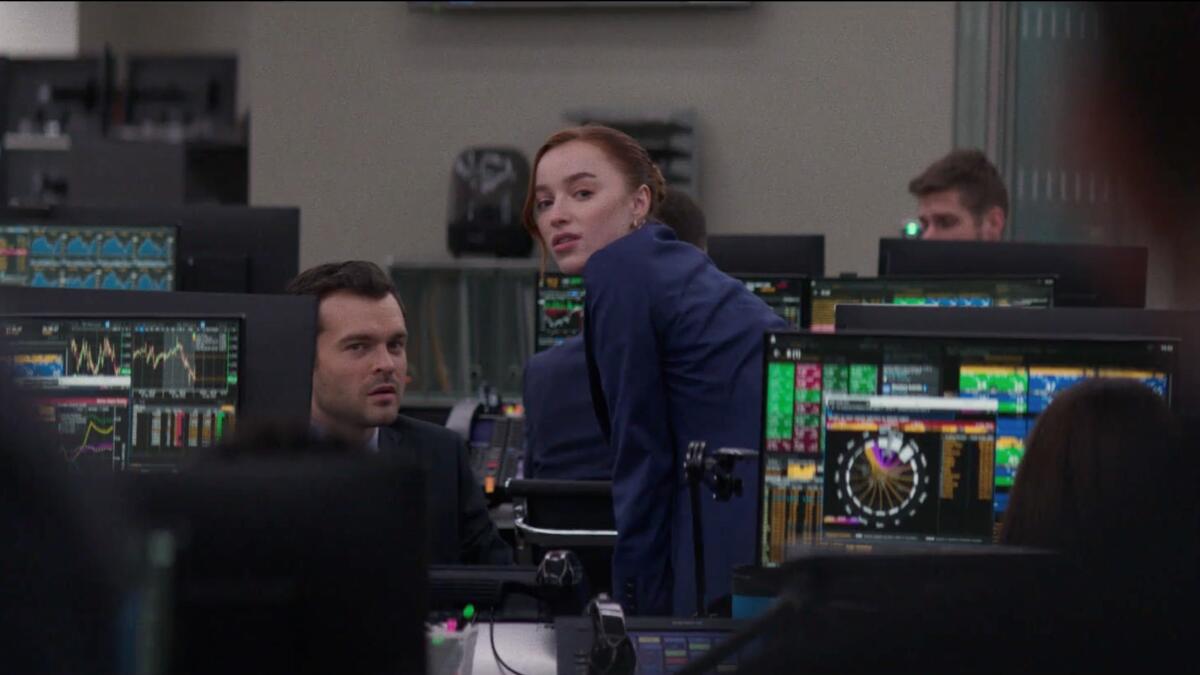Review: Bedroom and boardroom intrigue abounds in Netflixâs wickedly entertaining âFair Playâ

Chloe Domontâs âFair Play,â a smart, crackling thriller about sex, money, gender and power in the modern age, begins with a wickedly funny omen. Emily (Phoebe Dynevor) and Luke (Alden Ehrenreich), hot and horny and deliriously happy, have slipped away from a wedding reception (not theirs) for a bathroom quickie â an ill-timed tryst in every sense, leaving Emilyâs dress and Lukeâs lips stained with menstrual blood. They gasp in shock but laugh it off; theyâre too drunk, on booze and each other, to worry about what everyone will think. And then Emily spies the ring thatâs slipped out of Lukeâs pocket, spurring him to drop clumsily to one knee, red of lip but gallant of spirit, and offer up a sweet if singularly indecent proposal.
By next sunrise, the newly engaged lovers have sobered up, and the question of what everyone will think reasserts itself. A clever sequence chronicles their morning ritual at their Chinatown apartment, as they scrub away any hint of romantic afterglow, don trim, dark suits and head off on their own separate ways â and arrive, almost simultaneously, in the same elevator of the same Lower Manhattan glass-and-steel fortress. Emily and Luke are both junior analysts at a hedge fund, One Crest Capital, and their relationship is a violation of corporate policy. So far theyâve managed to keep it off the books, hoping that someday soon theyâll be successful enough to go public without fear of repercussions.
But what if one of them succeeds and the other doesnât? Specifically, what if Luke, though rumored to be in line for a promotion, turns out to be just another Wall Street mediocrity, soon to be kicked to the curb if he doesnât quit in frustration or jump out a window first?
And what if Emily, whoâs been quietly knocking âem dead for months, is summoned to have a drink in the middle of the night with the big boss, Campbell (Eddie Marsan, icily mesmerizing), and told that sheâs the companyâs newest portfolio manager? In some ways, we already know the answer as soon as Emily anxiously returns home to deliver the good news. Lukeâs first reaction is to wonder if Campbell made a pass at her, an expression of concern that is also, of course, the ultimate insult. And as the truth sinks in, not even his stiffly congratulatory smile (âIâm so fâ proud of you,â he says, a little too forcefully) can conceal the shock and resentment in his eyes.

Things clearly arenât going to end well. But if âFair Playâ spends the better part of two hours tracing this newly lopsided romance to its logical, unhappy conclusion, the blow-by-blow machinations are still a chilly wonder to behold. What gives the movie its driving tension isnât just the glaring imbalance between Emily and Luke as employees, but a deeper incompatibility between the personal and professional imperatives theyâve chosen. Modern romance insists on projecting at least the illusion of equality, but the cutthroat capitalist world in which Emily thrives (and where Luke struggles to maintain a foothold) has no real use for appearances. Youâve either got it or you donât.
The tension builds slowly but deliciously, as the leads lock us into an ostensible battle of the sexes that neither character can win. Ehrenreich, whose dark-princeling good looks can curdle at will, makes Luke a fascinating swirl of ego, entitlement and fragility. He fumes in silence at his desk, listening as his co-workers speculate about who Emily must have screwed or screwed over to get ahead. (Does he want to defend her honor or join the pile-on?) Compounding his humiliation, he now reports to Emily, answering her questions, taking her orders and offering buy-or-sell recommendations that she has the power to accept or reject.

Domont, making a sharply assured feature debut, knows her way around these gleaming corridors of power. (Her TV credits include episodes of âSuits,â âBallersâ and âBillions.â) What sheâs mounted here is less a throwback than an up-to-the-minute rejoinder to corporate thrillers like âWall Streetâ and âDisclosure,â among other touchstones of the â80s and â90s Michael Douglassance. A lot may have changed since then (the technology, for starters), and also since the rapacious â60s sexism of âMad Men,â an allusion prompted by Rich Sommerâs sly performance as Campbellâs silky No. 2.
But âFair Playâ knows that less has changed than weâd like to tell ourselves, and not even the ostensible reforms of #MeToo can chase away the inherent misogyny of the elite corporate class. On the contrary, the genuine progress that Emilyâs elevation represents can all too easily be weaponized against her, dismissed as a sop to political correctness over merit. And if Domont has a sharp ear for the breathlessly impenetrable jargon of high finance, sheâs also keenly attuned to the piggish wisecracks that pass for small talk. For Emily, a bad day means Campbell calling her a âdumb fâ bitchâ to her face; a good night means proving she can roll with the boys and celebrate a six-digit commission at the local strip club.
Shooting through glass partitions and around multi-screen computer terminals, Domont extracts drama and meaning not just from her charactersâ desperate glances and conspiratorial whispers, but also from the very layout of the office itself, where the hierarchies are etched into the floor plan and the ugly fluorescent lighting exposes every lie and magnifies every tension. She and her cinematographer, Menno Mans, draw a stark visual contrast with Emily and Lukeâs dimly lit, sparsely furnished apartment, where their once-loving dynamic struggles to reassert itself. The movie keeps following them back and forth, between boardroom and bedroom, turning these public and private worlds into complementary, near-contiguous war zones.

âFair Playâ doesnât entirely avoid a trap common to its subgenre, namely that what happens at the office is inevitably more scintillating â and persuasive â than damn near everything else. At home, Luke spirals, sputters and loses himself in self-help banalities, while Emily tries in vain to re-energize their sex life, a subplot that puts maybe too fine a point on her fiancĂŠâs professional impotence. Some late family drama creeps in from the sidelines, but it feels like an unnecessary distraction, an attempt to add yet more stories to an already precarious house of cards. It all falls apart spectacularly, of course, with two tough, punitive scenes of violence â one utterly horrifying, the other undeniably satisfying. Rarely has âcutting your lossesâ taken on such cathartic new meaning.
'Fair Play'
Rating: R, for pervasive language, sexual content, some nudity and sexual violence
Running time: 1 hour, 53 minutes
Playing: Starts Sept. 29 at Landmark Pasadena Playhouse; Landmark Theatres Sunset, West Hollywood; the Landmark Westwood; starts streaming Oct. 6 on Netflix
More to Read
Only good movies
Get the Indie Focus newsletter, Mark Olsen's weekly guide to the world of cinema.
You may occasionally receive promotional content from the Los Angeles Times.











